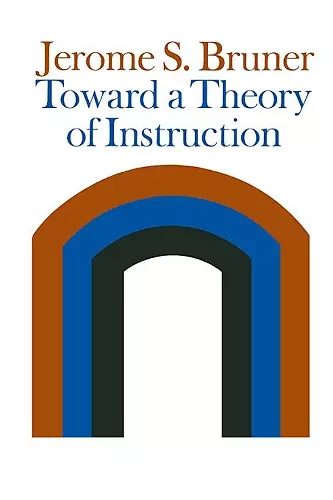Toward a Theory of Instruction
Format:Paperback
Publisher:Harvard University Press
Published:31st Jan '74
Should be back in stock very soon

Stimulating and provoking. -- John Nisbet
This country’s most challenging writer on education presents here a distillation, for the general reader, of half a decade’s research and reflection. His theme is dual: how children learn, and how they can best be helped to learn—how they can be brought to the fullest realization of their capacities.
Jerome Bruner, Harper’s reports, has “stirred up more excitement than any educator since John Dewey.” His explorations into the nature of intellectual growth and its relation to theories of learning and methods of teaching have had a catalytic effect upon educational theory. In this new volume the subjects dealt with in The Process of Education are pursued further, probed more deeply, given concrete illustration and a broader context.
“One is struck by the absence of a theory of instruction as a guide to pedagogy,” Mr. Bruner observes; “in its place there is principally a body of maxims.” The eight essays in this volume, as varied in topic as they are unified in theme, are contributions toward the construction of such a theory. What is needed in that enterprise is, inter alia, “the daring and freshness of hypotheses that do not take for granted as true what has merely become habitual,” and these are amply evidenced here.
At the conceptual core of the book is an illuminating examination of how mental growth proceeds, and of the ways in which teaching can profitably adapt itself to that progression and can also help it along. Closely related to this is Mr. Bruner’s “evolutionary instrumentalism,” his conception of instruction as the means of transmitting the tools and skills of a culture, the acquired characteristics that express and amplify man’s powers—especially the crucial symbolic tools of language, number, and logic. Revealing insights are given into the manner in which language functions as an instrument of thought.
The theories presented are anchored in practice, in the empirical research from which they derive and in the practical applications to which they can be put. The latter are exemplified incidentally throughout and extensively in detailed descriptions of two courses Mr. Bruner has helped to construct and to teach—an experimental mathematics course and a multifaceted course in social studies. In both, the students’ encounters with the material to be mastered are...
Though good sense on the subject of education is not quite in the man-bites-dog category, it is sufficiently rare to be newsworthy. When it appears in conjunction with cogency, insight, wisdom and style, as it does in Jerome Bruner’s book, the result is a heady mixture… What makes this book particularly rewarding is the quality of [Bruner’s] insights—for example, he speaks of language as a calculus of thought. What makes his book important is the heightened spirit of ferment that it is bound to bring education. -- Banesh Hoffmann * New York Times Book Review *
This eminent scholar has proven again that the scientific understanding of education is not a replacement of the art but an addition to it. It is clear that he himself is both a creative scientist and a brilliant teacher. * Washington Post *
Gracefully written, lucid, and, uniquely among contemporary commentaries on education, never shrill. Bruner sketches out a theory of human development and a theory of instruction, he writes of education as a product of cultural evolution and of cultural evolution as a course of study for children, he rehearses strong opinions about the relation between English style and thinking and about the nature of ‘the will to learn,’ he presents some beguiling observations on children with learning blocks, and, despite the range that he covers, he manages a certain thematic unity… Bruner raises issues of great consequence. -- William Kessen * Science *
[Bruner] has contributed with such wise ingenuity to the improvement of American education…[His] book is a mosaic of essays arranged with compassionate skill, speaking out of the great tradition of William James. No teacher of any child at any age can afford not to know this book well. -- Frank G. Jennings * The Progressive *
Stimulating and provoking. -- John Nisbet
ISBN: 9780674897014
Dimensions: unknown
Weight: 231g
192 pages